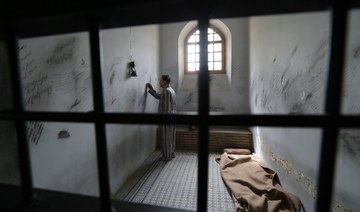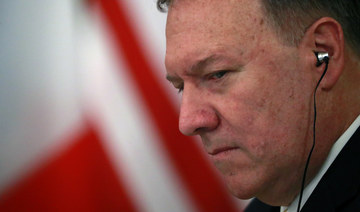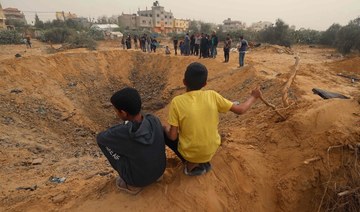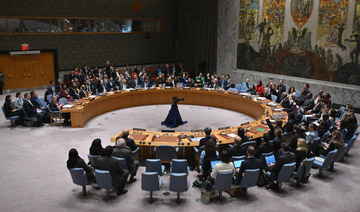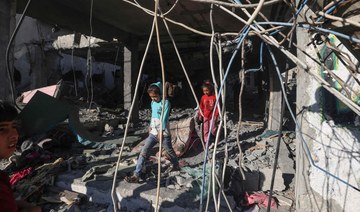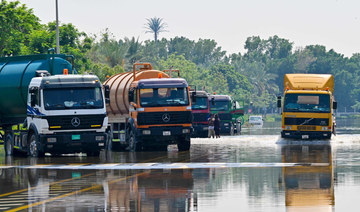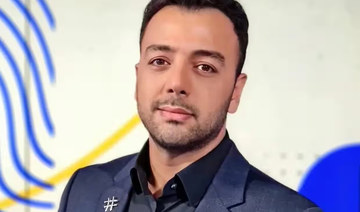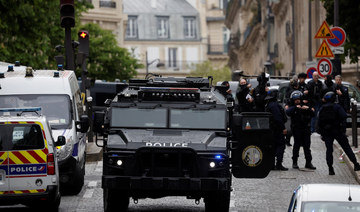TEHRAN: A Princeton scholar held for three years in Iran on widely criticized espionage charges was freed Saturday as part of a prisoner exchange that saw America release a detained Iranian scientist, a rare diplomatic breakthrough between Tehran and Washington after months of tensions.
The trade on the tarmac of a Swiss airport saw Iranian officials hand over Chinese-American graduate student Xiyue Wang for scientist Massoud Soleimani, who had faced a federal trial in Georgia over charges he violated sanctions by trying to have biological material brought to Iran.
The swap, however, had clear limits. Crushing US sanctions on Iran blocking it from selling crude oil abroad remain in place, part of President Donald Trump’s maximum pressure campaign imposed following his unilateral withdraw from Tehran’s nuclear deal with world powers last year. Those sanctions in part fueled the anger seen in nationwide protests last month that Iranian security forces violently put down, unrest that reportedly killed over 200 people.
Meanwhile, Western detainees from the US and elsewhere remain held by Tehran, likely to be used as bargaining chips for future negotiations. At least two American families of detainees, while praising Wang’s release, questioned why their loved ones didn’t come home as well.
Wang’s release had been rumored over recent days. One lawyer involved in his case tweeted out a Bible verse about an angel freeing the apostle Peter just hours before Iranian Foreign Minister Mohammad Javad Zarif broke the news in his own tweet. He posted pictures of himself with Soleimani at the Zurich airport before quickly whisking him back to Tehran by jet.
Trump shortly after acknowledged Wang was free in a statement from the White House, thanking Switzerland for its help. The Swiss Embassy in Tehran looks out for America’s interests in the country as the US Embassy there has been closed since the 1979 student takeover and 444-day hostage crisis.
“Thank you to Iran on a very fair negotiation,” Trump later tweeted. “See, we can make a deal together!”
Brian Hook, the US special representative for Iran, accompanied the Soleimani to Switzerland to make the exchange. He later posed for a photograph with Wang, who carried a folded American flag in his arms while wearing gray workout clothes.
Hook and Wang traveled to Landstuhl hospital near Ramstein Air Base in Germany where Wang likely will be examined by doctors for several days.
Wang’s wife, Hua Qu, released a statement saying “our family is complete once again.”
“Our son Shaofan and I have waited three long years for this day and it’s hard to express in words how excited we are to be reunited with Xiyue,” she said. “We are thankful to everyone who helped make this happen.”
Soleimani arrived at Tehran’s Mehrabad International Airport with Zarif, where his wife and family wrapped garlands of yellow and purple carnations around his neck. He briefly spoke to journalists from state-run media, his voice shaking and a tear running down his face under a portrait of the late Supreme Leader Ayatollah Ruhollah Khomeini.
Wang was sentenced to 10 years in prison in Iran for allegedly “infiltrating” the country and sending confidential material abroad. Wang was arrested in 2016 while conducting research on the Qajar dynasty that once ruled Iran for his doctorate in late 19th- and early 20th-century Eurasian history, according to Princeton.
Wang’s family and Princeton strongly denied the claims. The United Nations’ Working Group on Arbitrary Detention said “there was no legal basis for the arrest and detention.”
Westerners and Iranian dual nationals with ties to the West often find themselves tried and convicted in closed-door trials, only later to be used as bargaining chips in negotiations.
Soleimani works in stem cell research, hematology and regenerative medicine. He and his lawyers maintained his innocence, saying he seized on a former student’s plans to travel from the US to Iran in September 2016 as a chance to get recombinant proteins used in his research for a fraction of the price he’d pay at home.
Zarif in September said in an interview with NPR that he had pushed for an exchange of Wang for Soleimani. Speaking in Tehran on Saturday night, Zarif referred to Wang as a “spy” who received his release due to “Islamic mercy.”
It remains unclear whether this exchange will have a wider effect on Iranian-US relations. Iran has accused the US without evidence of being behind the mid-November protests over gasoline prices. The demonstrations and the crackdown reportedly killed at least 208 people, though Iran has refused to release nationwide statistics over the unrest.
Meanwhile, Iran’s Supreme Leader Ayatollah Ali Khamenei has ruled out direct talks between the nations.
A US official, speaking to journalists on condition of anonymity to discuss negotiations with Iran, suggested the maximum pressure campaign targeting Tehran would continue.
“There’s been absolutely no payment of cash or lifting of sanctions or any sort of concessions or ransom in any of these cases, and certainly not with respect to Mr. Wang,” the official said.
There had been signs a swap could be coming. In June, Iran released Nizar Zakka, a US permanent resident from Lebanon who advocated for Internet freedom and has done work for the US government. The US then deported Iranian Negar Ghodskani in September, who had been brought from Australia and later sentenced to time served for conspiracy to illegally export restricted technology to Iran.
Others held in Iran include US Navy veteran Michael White, who is serving a 10-year espionage sentence, as well as environmentalist Morad Tahbaz, an Iranian with US and British citizenship also initially sentenced to 10 years in prison.
Also in Iran are 83-year-old Baquer Namazi and his son, Siamak Namazi, dual Iranian-American nationals facing 10-year sentences after they were convicted of collaborating with a hostile power. Baquer Namazi now is on a prison furlough, said Alireza Miryousefi, a spokesman at Iran’s mission to the United Nations. However, the Namazis say he remains unable to leave Iran.
Babak Namazi, Baquer’s son and Siamak’s brother, issued a statement saying he was “beyond devastated that a second president” had left the two behind. An earlier 2016 prisoner swap as the nuclear deal took effect saw prisoners including Washington Post journalist Jason Rezaian released but not the Namazis.
Former FBI agent Robert Levinson, who vanished in Iran in 2007 while on an unauthorized CIA mission, remains missing as well. Iran says that Levinson is not in the country and that it has no further information about him, but his family holds Tehran responsible for his disappearance.
“We can’t help but be extremely disappointed that, despite all its efforts, the United States government was unable to secure his release, especially after such a painful week for our family,” the Levinson family said in a statement. “Iranian authorities continue to play a cruel game with our father’s life, and with our family. But the world knows the truth, and Iranian leadership must come clean.”
Iran frees Chinese-American scholar for US-held scientist
Iran frees Chinese-American scholar for US-held scientist

- President Donald Trump separately acknowledged Wang was free in a statement from the White House, saying he “is returning to the United States”
- Tensions have been high between Iran and the US since President Donald Trump unilaterally withdrew America from Tehran's nuclear deal with world powers in May 2018
Palestinians to reconsider US ties after veto of bid for full UN membership, Abbas says
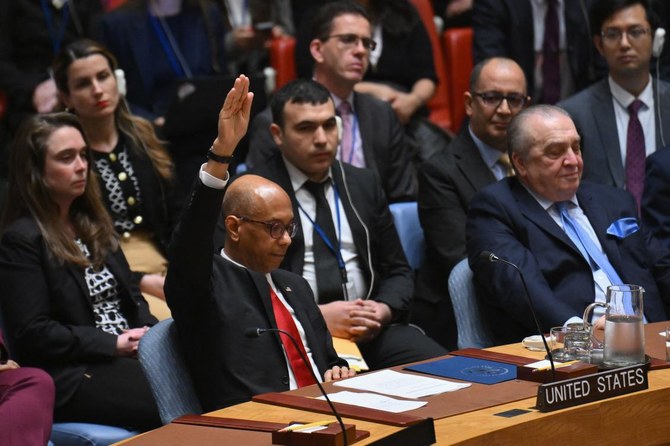
- Washington vetoed a Palestinian request for full United Nations membership
CAIRO: The Palestinian Authority will reconsider bilateral relations with the US after Washington vetoed a Palestinian request for full United Nations membership, President Mahmoud Abbas said in an interview with the official WAFA news agency.
Israel says its forces kill 10 militants in West Bank raid

- “Security forces eliminated 10 terrorists during encounters” over more than 40 hours, the army said
- Eight soldiers and a police officer had been injured in the raid
TULKARM, Palestinian Territories: The Israeli army said Saturday that its security forces killed 10 militants in an ongoing raid around Nur Shams, a refugee camp in the north of the occupied West Bank.
“Security forces eliminated 10 terrorists during encounters” over more than 40 hours, the army said in a statement.
The army said eight soldiers and a police officer had been injured in the raid.
An AFP journalist in nearby Tulkarem heard gunshots and blasts coming from Nur Shams on Saturday.
Residents contacted by AFP said there was a power outage and food was running short in the camp, saying nobody was allowed to enter or leave.
Since early last year violence has flared across the West Bank, which Israel has occupied since 1967. The violence has further escalated since the war in Gaza broke out on October 7.
Israeli forces say their frequent raids in the West Bank target Palestinian militants, but civilians are often among the dead.
Around 480 Palestinians have been killed by Israeli troops or settlers in the West Bank since the Hamas assault on Israel triggered the Gaza war, according to Palestinian official sources.
Emirates and flydubai resume normal operations after Dubai floods
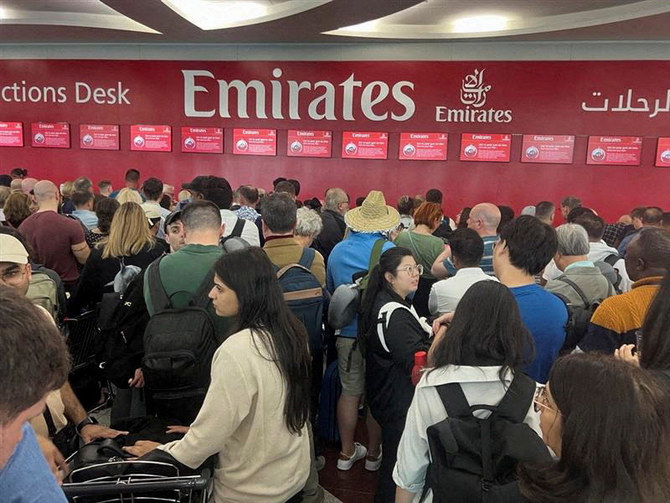
- Emirates canceled nearly 400 flights and delayed many more as a result of a record storm that hit the desert city of Dubai
RIYADH: Dubai’s flagship carrier Emirates and sister airline flydubai have restored normal operations after heavy rains caused severe flooding across the United Arab Emirates earlier this week, the airlines said on Saturday.
Emirates canceled nearly 400 flights and delayed many more as a result of a record storm that hit the desert city of Dubai on Tuesday, said a statement released by the airline’s president, Tim Clark.
Due to the impact of the storm, the airline suspended check-in for passengers departing from Dubai and halted its transit operations through Dubai International Airport, a major global travel hub, leaving thousands of travelers stranded.
The airport has struggled to return to normal operations after the storm flooded taxiways, forcing flight diversions, delays and cancelations.
Flydubai also returned to its full flight schedule from the airport’s Terminal 2 and Terminal 3 on Saturday following the weather-related disruption, a spokesperson for the airline said.
Clark said Emirates had provided 12,000 hotel rooms and 250,000 meal vouchers to customers who were affected. He added it would take days to clear the backlog of rebooked passengers.
The UAE has suffered the impact of the flooding for days, with roads between the city and Abu Dhabi still partially under water as of Saturday. In Abu Dhabi, some supermarkets and restaurants faced product shortages, unable to receive deliveries from Dubai.
Researchers have linked extreme weather events such as Tuesday’s storm to climate change and anticipate that global warming will lead to higher temperatures, increased humidity and a greater risk of flooding in parts of the Gulf region.
A lack of drainage infrastructure to cope with heavy rains in countries such as the UAE can put them at particular risk of flooding.
Israeli airstrike in Rafah kills at least 9 Palestinians, including 6 children
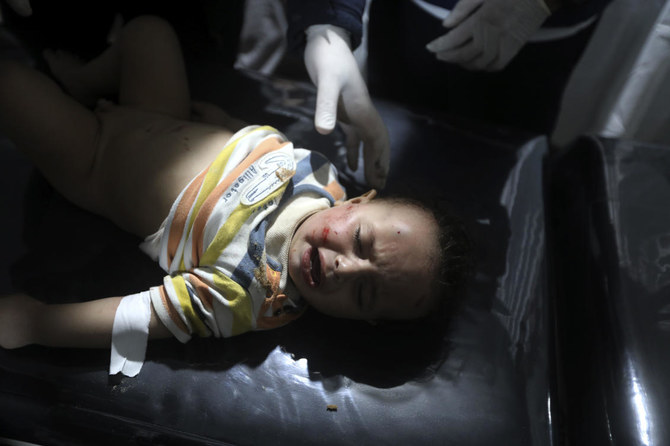
- Strike late Friday hit a residential building in the western Tel Sultan neighborhood of the city of Rafah
RAFAH, Gaza Strip: An Israeli airstrike on a house in Gaza’s southernmost city killed at least nine people, six of them children, hospital authorities said Saturday, as Israel pursued its nearly seven-month offensive in the besieged Palestinian territory.
Israel’s war against the Islamic militant group Hamas has led to a dramatic escalation of tensions in an already volatile Middle East.
The strike late Friday hit a residential building in the western Tel Sultan neighborhood of the city of Rafah, according to Gaza’s civil defense. The bodies of the six children, two women and a man were taken to Rafah’s Abu Yousef Al-Najjar hospital, the hospital’s records showed.
At the hospital, relatives cried and hugged the bodies of the children, wrapped in white shrouds, as others comforted them.
The fatalities included Abdel-Fattah Sobhi Radwan, his wife Najlaa Ahmed Aweidah and their three children, his brother-in-law Ahmed Barhoum said. Barhoum also lost his wife, Rawan Radwan, and their 5-year-old daughter Alaa.
“This is a world devoid of all human values and morals,” Barhoum told The Associated Press Saturday morning, crying as he cradled and gently rocked the body of Alaa in his arms. “They bombed a house full of displaced people, women and children. There were no martyrs but women and children.”
No victims were registered from a second overnight strike in the city.
Rafah, which lies on the border with Egypt, currently hosts more than half of Gaza’s total population of about 2.3 million people, the vast majority of whom have been displaced by fighting further north in the territory.
Despite calls for restraint from the international community, including Israel’s staunchest ally, the United States, the Israeli government has insisted for months that it intends to push a ground offensive into the city, where it says many of the remaining Hamas militants are holed up.
Such a ground operation has not materialized so far, but the Israeli military has repeatedly carried out airstrikes on and around the city.
The war was sparked by an unprecedented raid into southern Israel by Hamas and other militant groups on Oct. 7 that left about 1,200 people dead, the vast majority of them civilians, and saw about 250 people kidnapped and taken into Gaza. Israel says about 130 hostages remain in Gaza, although more than 30 have been confirmed to now be dead, either killed on Oct. 7 or having died in captivity.
The Gaza Health Ministry said Saturday the bodies of 37 people killed by Israeli strikes were brought to hospitals in Gaza over the past 24 hours. Hospitals also received 68 wounded, it said. The latest figures bring the overall Palestinian death toll from the Israel-Hamas war to at least 34,049, and the number of wounded to 76,901, the ministry said. Although the Hamas-run health authorities do not differentiate between combatants and civilians in their count, they say at least two thirds have been children and women.
The war has sent regional tensions spiraling, leading to a dramatic eruption of violence between Israel and its archenemy Iran that threatened to escalate into a full-blown war.
On Friday, both Iran and Israel played down an apparent Israeli airstrike near a major air base and nuclear site in central Iran, indicating the two sides were pulling back from what could have become an all-out conflict. Over the past several weeks, an alleged Israeli strike killed two Iranian generals at an Iranian consulate in Syria and was followed by an unprecedented Iranian missile barrage on Israel.
Israel has also faced off with the Hezbollah militant group, an Iranian proxy operating from Lebanon, with the two sides there frequently trading rocket and drone attacks across the Lebanese-Israeli border. Yemen’s Iran-backed Houthi rebels have also joined the fray, launching strikes against merchant ships in the Red Sea and the Gulf of Aden in what they say is a campaign of solidarity with the Palestinians in Gaza.
Tension has also been high in the occupied West Bank, where an Israeli military raid Friday in the Nur Shams refugee camp killed at least four Palestinians, including three militants, according to the Israeli military, Palestinian health officials and a militant group.
Palestinian health authorities said one of those killed was a 15-year-old boy shot dead by Israeli fire. The Islamic Jihad militant group confirmed the deaths of three members, including one who it said was a local military commander. The Israeli military said four Israeli soldiers were slightly wounded in the operation.
Saraya Al-Quds, the military arm of Islamic Jihad, said its fighters had engaged in heavy gunbattles Saturday morning with Israeli forces in the town of Tulkarem, adjacent to Nur Shams. No further details were immediately available. Residents in Tulkarem went went on a general strike Saturday to protest the attack on Nur Shams, with shops, restaurants and government offices all closed.
Since the Oct. 7 Hamas attack on southern Israel, more than 460 Palestinians have been killed by Israeli fire in the West Bank, Palestinian health officials say. Israel stages frequent raids into towns and cities in the volatile territory. The dead have included militants, but also stone-throwers and bystanders. Some have also been killed in attacks by Israeli settlers.
Iran FM downplays reported Israeli retaliation

- Israeli officials have made no public comment on what happened Friday
- Overnight last Saturday-Sunday Iran launched its first-ever direct attack on Israeli territory
Tehran: Iran’s foreign minister has dismissed as akin to child’s play the reported Israeli retaliation for an unprecedented Iranian strike, and said Tehran would not respond unless Iranian “interests” were targeted.
On Friday, Iran’s state media reported explosions were heard after, according to an official, small drones were successfully shot down.
Media in the United States quoted officials there as saying Israel had carried out strikes in retaliation for Tehran’s drone and missile barrage fired at Israel last weekend.
“What happened last night was no attack,” Foreign Minister Hossein Amir-Abdollahian told NBC News in a Friday interview.
“It was the flight of two or three quad-copters, which are at the level of toys that our children use in Iran.”
He added that, “As long as there is no new adventure on behalf of the Israeli regime against Iran’s interests, we will have no response.”
Friday’s explosions prompted world leaders to appeal for calm and de-escalation with fears of wider conflict against the backdrop of the war in Gaza which began on October 7.
Overnight last Saturday-Sunday Iran launched its first-ever direct attack on Israeli territory. The barrage was in response to a deadly April 1 air strike on Tehran’s consulate in Damascus, which Iran blamed on Israel.
The Israeli army said the vast majority of the more than 300 missiles and drones fired by Iran were shot down — with the help of the United States and other allies — and that the attack caused only minimal damage.
Israeli officials have made no public comment on what happened Friday, and analysts said both sides are looking to de-escalate, for now.
“If the Israeli regime intends to take another action against our interests, our next response will be immediate and to the maximum,” Amir-Abdollahian said in the interview.




